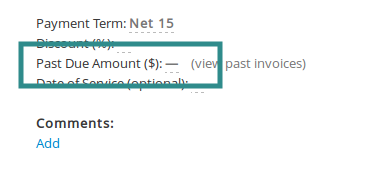

#Collecting past due invoices how to
Setting System Parameters explains how to do this, and summarizes other collector parameters available from this menu. When trying to recover unpaid bills from customers, it is very important to ensure the approach taken in your debt collection effort is neither too aggressive nor overly-lenient. In this article, you will learn a polite way to ask your customers to pay their overdue balances. This type of document works to gently remind the customer that their account is past due and they need to pay the requested amount. The first letter is an initial letter demanding payment for. A friendly collection letter is the first step in an attempt to collect past-due funds. The grace period specifies the number of days after the invoice is due that can elapse before Oracle Sales Compensation issues a compensation transaction with a negative amount of sales credit.īefore you run your compensation system with production data, you need to activate this and other system parameters. Use this document to create two letters demanding payment for an overdue invoice (or invoices). In the Collection region, enter the grace period in the Clawback Grace Days field. Navigate to the System Parameters window.ģ. If necessary, log onto the Calculator instance, or the instance that is both the Collector and Calculator.Ģ.

For example, if Global Computers representative Pat Smith received $1000 sales credit when he booked an order for consulting services, and another $1000 when Receivables posted the invoice to GL, Oracle Sales Compensation claws back a total of $2000 when the clawback grace period expires.įor more information on setting the amount of sales credit a given representative receives, see Distributing Compensation Across Transactions.ġ. The amount of negative sales credit is equal to the amount of credit the salesperson has received thus far for this particular sale.

The clawback grace period is a system parameter with a default of 30 days: if a cash receipt is not posted by Oracle Receivables within 30 days of the invoice due date, Oracle Sales Compensation creates a compensation transaction to take back sales credit already given. Each time you run the process to collect transactions, Oracle Sales Compensation checks whether the grace period has passed. When you specify that you want to "collect" clawback transactions, you specify a period of time, or a grace period, that the invoice is allowed to go past-due before Oracle Sales Compensation takes back compensation credit the salesperson received for the invoice transaction. The clawback event type lets you take back compensation credit for overdue customer payments (Figure 4 - 5). Collecting Past-Due Invoices (Oracle Sales Compensation Help)


 0 kommentar(er)
0 kommentar(er)
